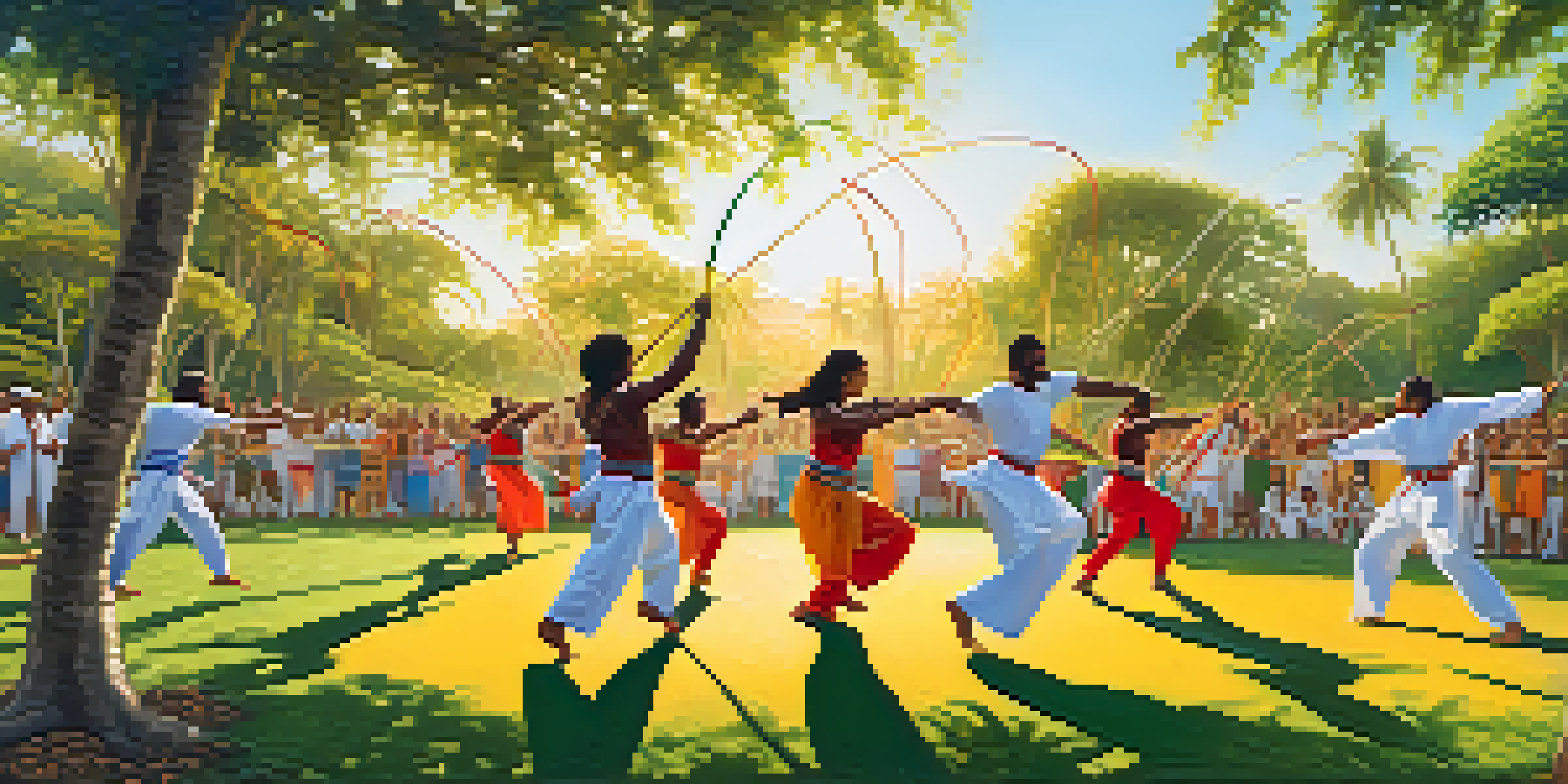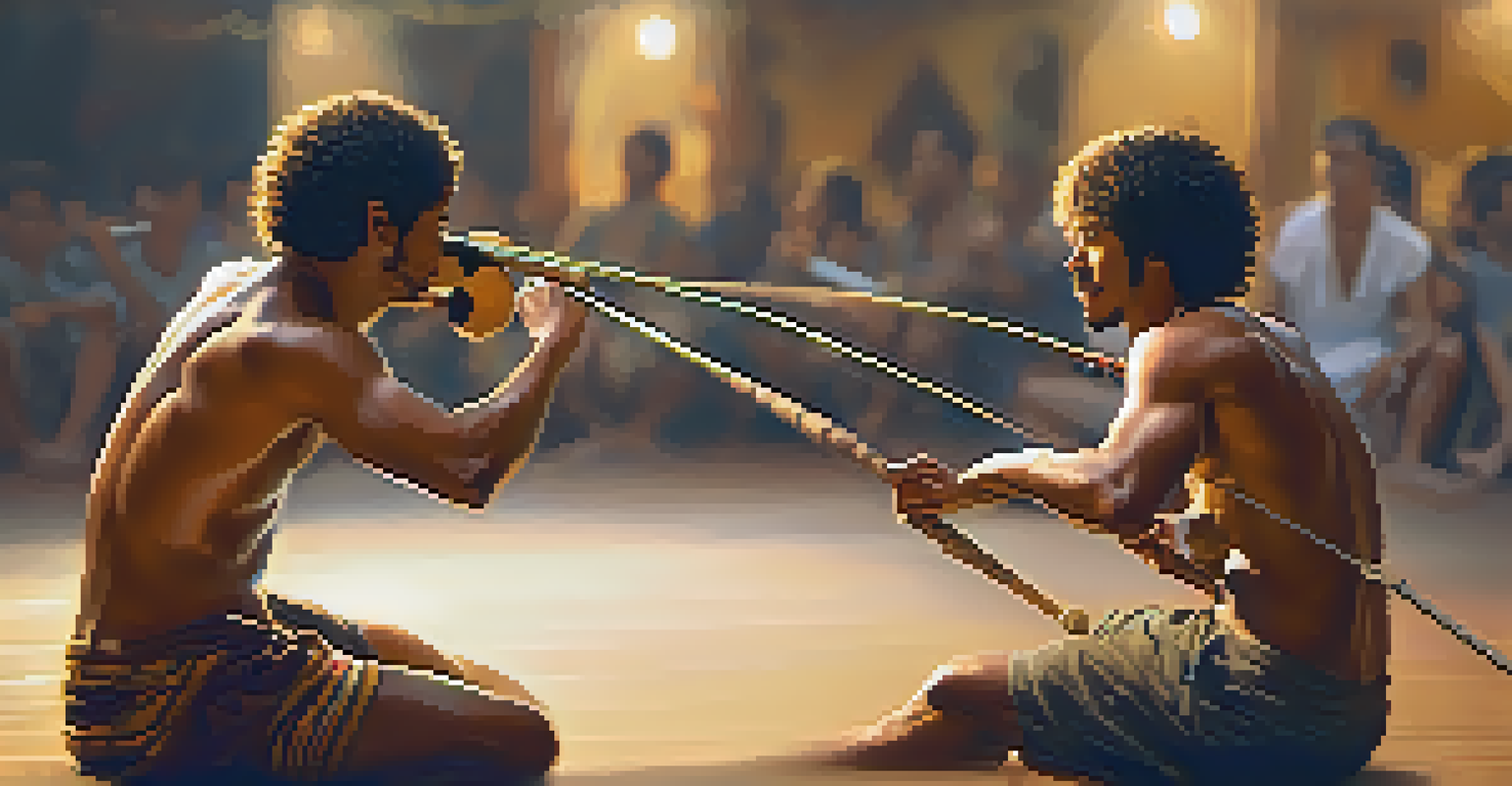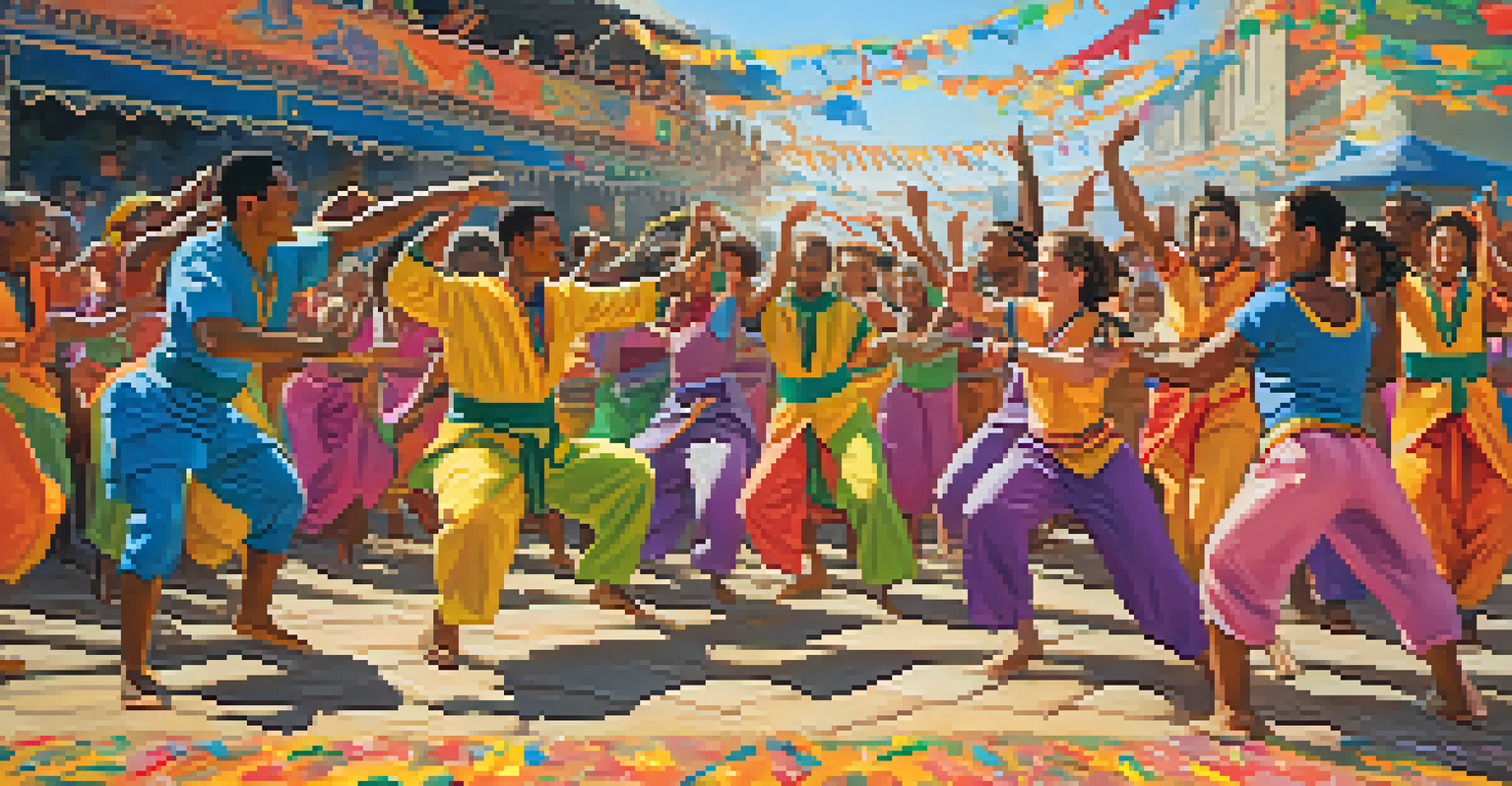The Role of Capoeira in Brazilian Culture and Community Life

Understanding Capoeira: More Than Just a Dance
Capoeira is a unique blend of martial arts, dance, and music that originated in Brazil. Its roots can be traced back to African slaves who used it as a form of resistance. The fluid movements and rhythmic music create an engaging atmosphere that captivates both participants and spectators.
Capoeira is a game that teaches you about life, about how to be free and how to express yourself.
Unlike traditional martial arts, Capoeira emphasizes fluidity and improvisation, allowing players to express their creativity. The practice is often accompanied by traditional instruments like the berimbau, which sets the pace and mood. This vibrant art form not only showcases physical skill but also reflects a rich cultural heritage.
In Capoeira, the 'roda' or circle is a central element where players engage with one another. This communal aspect fosters a sense of belonging and solidarity among practitioners. Through Capoeira, individuals connect with their cultural roots and share experiences that strengthen community bonds.
The Historical Roots of Capoeira in Brazil
Capoeira emerged in the 16th century, during Brazil's colonial period when African slaves fought for their freedom. It served as a disguise for combat training, allowing slaves to practice self-defense without attracting the attention of their oppressors. This historical significance adds depth to the practice, transforming it into a symbol of resilience and resistance.

As Brazil evolved, so did Capoeira, adapting to societal changes while preserving its core values. It became a means of cultural expression for Afro-Brazilian communities, embodying struggles and triumphs. Over the years, Capoeira has transcended its origins, gaining recognition and appreciation worldwide.
Capoeira: A Cultural Fusion
Capoeira combines martial arts, dance, and music, reflecting a rich cultural heritage and fostering community connections.
Today, Capoeira is celebrated not just in Brazil but globally, with schools and practitioners found in many countries. This international presence highlights Capoeira's role as a bridge between cultures, facilitating connections and exchanges that enrich its practice. Its journey from the streets of Brazil to the world stage is a testament to its enduring impact.
Capoeira as a Tool for Social Change
Capoeira has played a pivotal role in promoting social change, particularly in marginalized communities. Many organizations use Capoeira as a vehicle for empowerment, offering classes that teach discipline and self-esteem. By engaging youth in Capoeira, these programs provide a constructive outlet for energy and creativity.
Through capoeira, we learn to respect our traditions and share a piece of our culture with the world.
The inclusivity of Capoeira encourages participation from individuals of all backgrounds. This openness fosters intercultural dialogue and understanding, breaking down barriers that often divide communities. In this way, Capoeira becomes a powerful tool for social cohesion and unity.
Moreover, Capoeira promotes values such as respect, teamwork, and perseverance. These principles resonate beyond the practice itself, instilling life skills that participants carry into their everyday lives. As a result, Capoeira contributes to building stronger, more resilient communities.
The Role of Music in Capoeira
Music is an integral part of Capoeira, enhancing its dynamic nature. The traditional rhythms, played on instruments like the berimbau, create an immersive experience that energizes the participants. This musical component not only sets the pace for the movements but also creates a unique atmosphere full of emotion and expression.
Songs sung during Capoeira sessions often tell stories or convey messages that resonate with the culture. They serve to connect the players to their history, reinforcing the significance of their practice. This lyrical aspect adds depth to Capoeira, allowing participants to engage with their heritage on a more profound level.
Historical Significance of Capoeira
Emerging as a form of resistance during Brazil's colonial period, Capoeira symbolizes resilience and the fight for freedom.
Furthermore, the interactive nature of Capoeira music promotes collaboration among practitioners. As everyone joins in the singing and playing, it fosters camaraderie and shared experience. This communal participation amplifies the sense of belonging, making Capoeira a truly collective celebration of culture.
Capoeira's Influence on Brazilian Identity
Capoeira is not just an art form; it is a significant part of Brazilian identity. The practice reflects the country's rich cultural tapestry, woven from African, indigenous, and European influences. As such, Capoeira stands as a symbol of unity and diversity within Brazilian society.
The global popularity of Capoeira has also contributed to the promotion of Brazilian culture worldwide. As practitioners travel and share their skills, they introduce others to the vibrancy of Brazil's artistic heritage. This cultural exchange enriches both Brazil and the countries where Capoeira is practiced.
Moreover, Capoeira has inspired various forms of artistic expression, including dance, theater, and film. These adaptations further embed Capoeira into the broader narrative of Brazilian culture, showcasing its versatility and relevance. As a result, Capoeira continues to evolve while remaining a cornerstone of national identity.
Capoeira in Education and Youth Programs
In recent years, Capoeira has found its way into educational settings, promoting physical fitness and cultural awareness among students. Schools across Brazil and beyond are incorporating Capoeira into their curricula, recognizing its benefits for both body and mind. Through movement and rhythm, students learn valuable skills that extend beyond the classroom.
Youth programs often utilize Capoeira to foster teamwork and cooperation. By working together in the roda, participants develop social skills and learn the importance of supporting one another. These experiences not only enhance their Capoeira practice but also prepare them for future challenges in life.
Capoeira Promotes Social Change
As a tool for empowerment, Capoeira encourages inclusivity, teamwork, and cultural dialogue within marginalized communities.
Additionally, Capoeira serves as a platform for discussing important social issues, such as race and identity. Educators use this art form to encourage dialogue and reflection among students. This approach not only enriches their understanding of Capoeira but also empowers them to engage with their communities meaningfully.
Celebrating Capoeira: Festivals and Events
Capoeira is celebrated through various festivals and events that gather practitioners from around the globe. These gatherings serve as a showcase of talent, culture, and community spirit, creating an electrifying atmosphere. Participants engage in workshops, performances, and friendly matches, sharing their skills and love for Capoeira.
One of the most notable events is the annual Capoeira Festival, which draws participants from different backgrounds and skill levels. This celebration highlights the diversity within the Capoeira community, showcasing its rich traditions and contemporary expressions. It also fosters connections between practitioners, creating lasting friendships and networks.

These festivals not only provide a platform for learning and sharing but also reinforce the values of respect and camaraderie inherent in Capoeira. As participants come together to celebrate their shared passion, they contribute to the ongoing legacy of Capoeira as a living, evolving art form. Ultimately, these events strengthen the ties that bind the Capoeira community, ensuring its vibrant future.